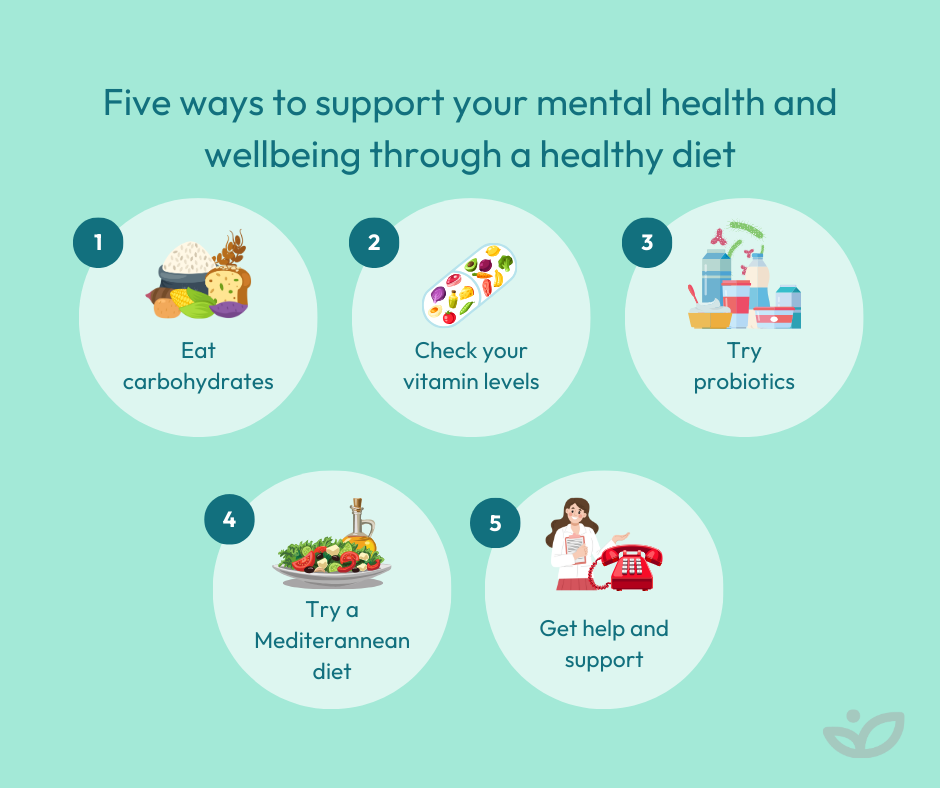Shift work such as night working, long hours and stress are just some of the lifestyle factors that can affect our eating habits. It is commonly acknowledged that a healthy diet is good for our physical health, but what about our mental health?
One study* suggests that poor diet can aggravate existing mood disorders and neuropsychiatric conditions. Moreover, both this study and a more recent review suggests that a healthy diet can have preventative effects for mental health conditions.
Below, we list five evidence-based ways that a healthy diet could support your mental health and wellbeing. Please remember that if you are worried about yourself or someone else, it is important to get support as soon as possible (see ‘Get support’ below).

Five ways to support your mental health and wellbeing through a healthy diet
- Eat carbohydrates
- Check your vitamin levels
- Try probiotics
- Try a Mediterranean diet
- Get help and support
Eat carbohydrates to fuel your brain
Carbohydrates such as wholegrains, vegetables, fruits and legumes (foods like lentils and peas) provide our brains with the fuel they need to keep going. That’s because carbohydrates contain glucose, as well as helpful vitamins and minerals, which support our concentration and keep us focused.
It can be tempting to swap carbohydrates for highly refined sugar foods such as sweets, donuts and cakes because they may give us temporary boost in energy. However, the refined carbohydrates in these types of foods actually spike our blood glucose levels leading to more hunger and sleepiness making concentration at work very difficult.
Over a longer period of time an excess of refined sugars in our diets can cause diseases like Type 2 diabetes.
Carbohydrates tend to release glucose into the body more slowly. You could try:
- Sweet potato
- Bananas
- Wholemeal bread
- Oats
- Brown rice
- Lentils
Check your vitamin levels – they support mood
The BDA reports that missing vitamins and minerals can cause tiredness, depressive symptoms and irritation among other symptoms. If you feel this way, speak to your GP; it could be due to vitamin deficiency, or another reason that you may need help and support with.
A recent review* suggests that nutrients support body systems, including our brains, to function normally. For example, zinc, magnesium and B vitamins play an important role in regulating the nervous system. Our nervous system is responsible for sending messages to other parts of the body about movement and feelings/ sensations like pain. A nutrient deprived diet may cause our nervous system to become overactive or dysregulated, making us more sensitive to our environment and responding with feelings of irritation or anxiety.
Foods containing high levels of zinc, magnesium or vitamin B:
- Mushrooms
- Oats
- Greek yoghurt
- Chickpeas
- Spinach
- Dark chocolate
- Avocado
- Eggs
- Cheese
- Fish (also contains Omega-3 supporting brain function)
Try probiotics for a happy brain–gut relationship
Probiotics are live bacteria and yeasts that can support the colonies of good bacteria that usually live inside your gut. Taking probiotics, either as supplements or through eating dairy and pickled foods, can have effects wider than just our gut. There is evidence that they can alter the levels of neurotransmitters in our brains – chemicals that effect the way we feel.
However, this also means that stresses that you are experiencing can have a negative impact on your gut, so it’s important to tackle causes of stress too.
Probiotic foods include:
- Kefir
- Sauerkraut
- Kombucha
- Cultured cottage cheese
Try a Mediterranean diet to reduce symptoms of depression and anxiety
Some studies have measured the effects of a Mediterranean diet over as little as 12 weeks, and have shown it results in less depressive and anxiety symptoms.
Other studies suggest that eating a Mediterranean diet over a much longer period of time can reduce the risk of developing neurological disorders by 28% and protect individuals from developing anxiety.
Features of a Mediterranean diet:
- Vegetables such as courgettes, aubergines and onions
- Fruit and nuts such as oranges, tomatoes, almonds, chestnuts and pine nuts
- Fish such as tuna, salmon and sardines
- Cooking with olive oil
Get help and support with eating concerns
Eating well is important and can bring many health benefits, however sometimes we need help and support with altering the way and the things we eat.
It can be much easier to recognise unhealthy eating patterns in others than in ourselves. This is why we’ve included some helpful links so you can recognise these patterns and find the best way of approaching this with the person concerned:
- Do I have an eating disorder?
- What are the signs, symptoms and treatments for eating disorders? (NHS)
- What help and support is available?
- What support is available for families?
With thanks to NHS practitioner, Tamsin Speight for her contribution to this blog.
*This blog was based on evidence from the following studies:

